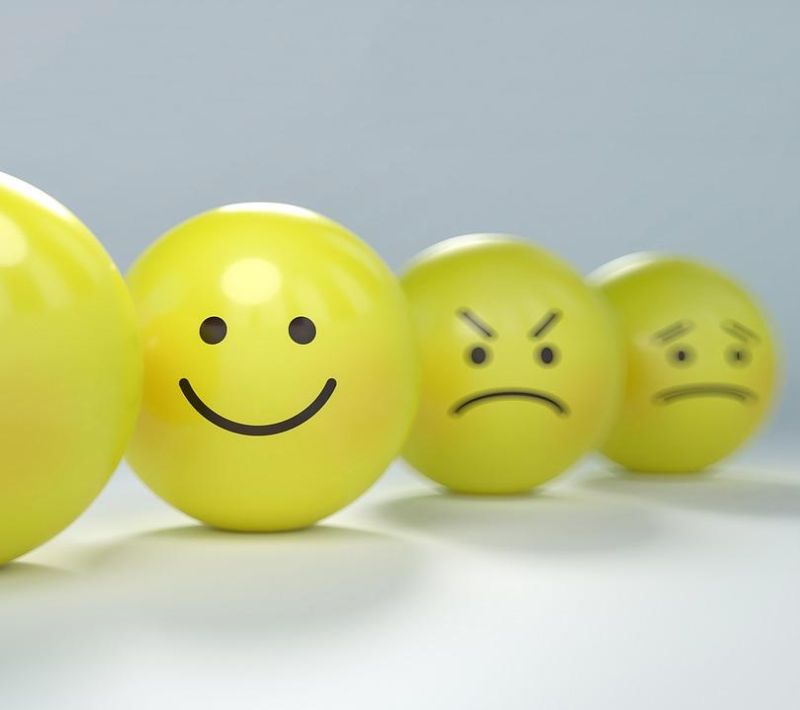Being Emotional: Is it Actually Good or Bad?

BEING TOO EMOTIONAL IN A WORLD CONSTANTLY ON THE GO
Every human being experiences emotions of various kinds on a daily basis. We get angry, sad, overly excited and full of anxiety: in one word, emotional. After all, among everything that makes us thick, emotions have a great role to play. However, there are some who have an extra dose of this phenomenon in them. They tend to exhibit intense sensitivity to goings-on around them and their emotions come to the fore at the slightest provocation.
There have been numerous arguments about whether or not it is okay to be too emotional. While some people see it as a normal human experience that doesn’t require special attention, others see it as a malady that needs to be treated as soon as it is detected. In view of this, it is important to point out that in actuality, being highly emotional has its ups and downs. It is wrong to feel bad about it neither is it sensible to criticize one for it.
As the title of this write-up suggests, most people are quite insensitive to the peculiarities of different personalities. There are unspoken rules about what personalities are acceptable and those considered as not good enough for one to possess.
Sadly, being too emotional falls under the latter category. This sometimes leads to reactions such as low-self esteem, introversion and even depression among highly emotional people. In truth, it is the actions of those who criticize these persons that are not good enough.
Signs of Being Highly Emotional

There are certain pointers to show that one is a highly emotional individual. Some of them are quite conspicuous and common while others are subtly expressed.
1. Difficulty in Dealing With Criticism
Almost everyone does not like being criticized or judged for whatever reason. It is one common characteristics of humans as we all have an ego to protect. In the case of highly emotional people, however, this tendency is more prominent. Interestingly still, they are weary of criticism not necessarily in an attempt to save their ego, but because of the outburst of emotions that is often unleashed after such encounters.
2. You Frequently Get Overcome by Your Emotions
This is another sign that you might be quite emotional. It doesn’t necessarily translate to the fact that you cry all the time. Instead, different emotions just happen to get the better part of you. Anger at a colleague at work, sadness after a breakup and elation at the news of a promotion are all experienced intensely.
3. You’re Deeply Concerned About Others
Another quality of overemotional people is that they are deeply, genuinely affected by the feelings of others. Because, since they are quick to get emotional, they are able to detect it easily in others. Also, they understand how it feels to go through such a row, so they try to offer help to these persons as best as they can.
4. You Cry More Often
Obviously, right? Highly emotional individuals cry more often than they would like to admit. Many a times, these bouts of crying is usually spontaneous. One might just be thinking about a painful experience in the past and then, they start crying without realising it.
5. Difficulty in Making Decisions
This one could be very problematic. Highly emotional people are always confused when it comes down to making decisions, especially those that would affect their lives tremendously. This problem persists because they are usually overwhelmed by different shades of emotions whenever a decision is about to be made.
6. Lost in Thoughts
It is not uncommon for people with heightened emotions to be lost in their head for a long period of time. This may be as a result of certain emotions such as melancholy and anxiety.
Possible Reasons Why You’re Too Emotional

Various reasons why one is excessively emotional abound. These reasons vary from person to person as not all of them are actually generalizable to everyone. Some of them are common while others are situational and health-related. The following are therefore some well detailed explanations for intense emotional experiences:
1. The Human Nature
Yes, you read that right. As asserted earlier, we’re all emotional beings. Therefore, the fact that we experience emotions, even if excessively, confirms that we’re normal human beings. So this shouldn’t get us down. It is just the same way some people are more intelligent or skillful than others. What we should rather aim for is to master how to control these emotions and not allow them to take charge of us.
2. Stress
This is another reason for heightened emotions. Some people lack the ability to deal with stress properly. Therefore, when they’re bedevilled by fatigue or work stress, they tend to give in to their emotions easily.
3. Genetics
Heightened emotions could also be inherited from one’s parents. Several studies suggest that emotion is influenced by genetics. So if you’re experiencing excess emotional outbursts and you can’t really lay your fingers on why, chances are that you inherited the trait.
4. Great Life Changes
This includes getting a new job, getting married or divorced and becoming pregnant. Not everyone can deal with big changes in their lives such as these. In fact, occasional mood swings is one common phenomenon among pregnant women.
5. Personality Disorders
The Diagnostic and Statistical Manner of Mental Disorders, the guide published by the American Psychiatric Association defines personality disorders as “enduring patterns of inner experience and behaviour that deviates markedly from the expectations of the individual’s culture, is pervasive and flexible, has an onset in adolescence or early adulthood, is stable over time, and leads to distress or impairment.”
One common trait of many personality disorders is emotional dysregulation, – an inability to regulate one’s emotions.
People who have personality disorders such as narcissistic personality disorder and borderline personality disorder, find it difficult controlling anger or get angry without knowing why.
6. Poor Diet
Something as seemingly insignificant as poor diet could also contribute to emotional instability in persons. To avoid this, one needs to consume a nutrient-dense diet, avoid fast foods and skipping meals and make sure they’re not lacking in vital vitamins and minerals.
7. Trauma
This refers to an emotional wound which leads to a psychological injury. The effects of trauma are numerous, effects on one’s emotions not being left out. In relation to emotion, trauma breeds negative emotions such as fear, shame, sadness and guilt both during and after the traumatic experience.
8. Lack of Exercise
Lack of exercise could also lead to heightened emotions. Research has shown that exercise promotes emotional well-being, among other things. It helps to free the mind of clogged up emotions. The lack thereof would most likely lead to poor emotional stability.
Benefits of Being Highly Emotional

Having excess emotions also comes with its own perks. It’s not all negativity. Here are a few of them:
1. Helps to Create Deeper Relationship
People who have stronger emotions have a better sense about what they want from others and how others feel about them. They’re highly sensitive. This quality will go a long way in helping to build better relationships characterized by constant communication, relative peace and mutual understanding.
2. Important Lessons to Be Learnt
Being intensely emotional affords one the opportunity to learn certain life lessons. For example, one whose exhibition of excessive anger formerly landed them into trouble would take a cue from there and make an effort to react less emotionally when faced with a similar situation later on.
3. Greater Empathy
Because these persons are prone to emotional excesses themselves, they tend to be more understanding when others display similar characteristics. Hence, they make wonderful teachers and counsellors.
4. Better Problem Solvers
While it is true that rationalism rather than emotionalism is needed for effective problem solving, the role of emotions cannot be overemphasized. Since these crops of individuals are better observers, they tend to understand not only the problem but also the compendium of emotions that gave rise to it.
5. Helps in Emotion Control
However ironic this might sound, nothing is closer to the truth. In life, many people tend to ignore their feelings and try to numb themselves with stuff like over work, over eating, sex sprees, excessive drug intake, etc. Emotional persons, on the other hand, already aware of who they are, do not indulge in any of these, rather they attempt to learn how to control these emotions. This brings us to our last topic of discourse.
How To Be in Control of Your Emotions

As implied earlier, being too emotional is not totally bad. Even though highly emotional persons are consistently condemned, it is imperative that they see the good sides of their personality. Rather than pretending to be who they are not by downplaying their emotions, they could actually learn to get a better mastery of themselves and use it to their advantage.
Therefore, in this section, particular attention will be given to how one can effectively control one’s emotions.
1. Accept Your Emotions
When we accept our emotions, we get a better understanding of them. We can then move from there to learn how to be in charge of them. Ignoring them or pretending that they’re not there is not a good way to go. By doing that, we’re not only deceiving ourselves but also heightening our problem. So embrace your emotions today!
2. Discover What Causes You To Be Too Emotional
They’re different for different people. For some, it could be an annoying colleague at work, for others, it could be overthinking a situation. Whatever they are, it is expedient that we become aware of them, think critically if these triggers are worth our overly emotional reactions and then start working from there.
3. Take Responsibility
One common error highly emotional people make is playing the blame game. They constantly blame others for their emotional reactions. This is wrong. We need to realise that we are the sole persons responsible for our emotional excesses. We can decide to either get mad at others, sad at a situation or not. When we inculcate this philosophy, we become more in control of our feelings and are now able to keep our emotional excesses in check.
4. Take Time Away
Sometimes, what we just need is time alone and away from the rest of the world. This affords us the opportunity for reflection about our emotional state, among other things.
5. Do Not Respond to Stuff Immediately
One reason why we sometimes are caught up in emotional outbursts is that we do not pause to think before we give replies. This goes a long way in helping us organize our thoughts well and understanding the implication of what is about to be said. If done more often, it would go a long way in lessening the number of times our emotions get the better part of us, especially during conversations with others.
6. Know That Everything is Not Personal
Another reason for frequent emotional instability is the fact that we sometimes overthink situations. Sometimes, people make some not so good comments about us and we just assume it’s a deliberate attack on our personality.
This isn’t always the case. It could just be that such a person is one who prefers to call a spade a spade, not caring whose ox is gored in the process. So we should always give others the benefit of the doubt and do well to take everything with a grain of salt.
7. Learn to Let Go
It is not everything said or done to you that needs a reaction from you. Sometimes, in order to remain sane, it is advisable to just breathe and let go. In doing this, you’d be doing a lot of good to not only your emotional well being but also your mental health.
8. Learn to Ease Off
Learn to engage in activities that help you relax such as seeing a movie, playing video games or taking a walk. This helps to treat over-thinking which is a prominent catalyst of heightened emotions.

Finally, it should be emphasized that being emotional is not a bad thing, nor is it a disorder. It is simply a delicate trait that needs to be handled the right way so as not to lead to a disaster. The onus therefore behoves us to take charge of our emotions in order to avoid being controlled by them and with Oscar Wilde, we should vehemently assert, “I don’t want to be at the mercy of my emotions. I want to use them, to enjoy them and to dominate them.”
*All images are sponsored by Pixabay, free for commercial use and no attribution required.
The FastPencil man. Joshua's kind of writing goes out the bound of the normal professional forms of literature, he shifts your attention from the unknown to the anticipated. He thinks African; He is African!

